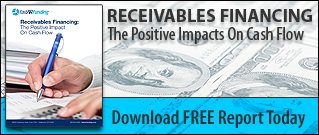 What is factoring? Factoring is the process of selling commercial accounts receivable to a factor at a discount. The factor pays the seller of the accounts receivable cash in exchange for the rights to collect payment from the seller’s customer. The seller benefits by receiving the majority of the amount due from the customer immediately, instead of having to wait 30, 60 or 90 days to be paid, and the factor benefits by charging a fee for the service.
What is factoring? Factoring is the process of selling commercial accounts receivable to a factor at a discount. The factor pays the seller of the accounts receivable cash in exchange for the rights to collect payment from the seller’s customer. The seller benefits by receiving the majority of the amount due from the customer immediately, instead of having to wait 30, 60 or 90 days to be paid, and the factor benefits by charging a fee for the service.
A factoring arrangement differs from short-term business loans in several ways. Most importantly, instead of two parties being involved in the transaction there are three since the customer of the seller is required to submit payment directly to the factor. Another way invoice factoring is different is that factoring companies typically rely on the credit strength of the seller’s customer in deciding if the seller qualifies for the arrangement, instead of the credit strength of the seller as is normally the case with short-term business loans.
Factoring companies normally pay between 70% and 95% of the face value of the invoice at the time of purchase and make the other 30% to 5% available when the customer pays the invoice.
Fees charged by factoring companies are determined based on a couple of important things:
- How long it takes your customers to pay – During the underwriting process companies are typically required to submit a customer list and accounts receivable aging. The factoring company takes this information and uses it to estimate how long it takes your customers to pay, and then uses it to set the fees. The longer it takes to receive payment the more it costs.
- The amount of factored sales – Like all other business, the more a firm factors the cheaper it is. Expect to see wide variations in pricing depending on the amount of factored sales.
Estimate The Positive Cash Flow Impact Of Factoring For Your Company
A simple way to estimate the cash flow benefit to your company from a factoring facility is to take the amount of current open accounts receivable, subtract all invoices 60 days or more past due, and multiply it by 80%. Most factors won’t advance against invoices 60 days past due and 80% is the most common advance rate used by factors. The following is a simple example.
Open accounts receivable: $100,000
Invoices 60 days plus past due: $10,000
Advance rate: $80%
Cash to your firm: $72,000
Think about what you could do with the extra cash provided by a factoring facility. Additional sales? One of the comments we get from prospective customers is that they are limiting the amount of sales they take on because they do not have the working capital to produce the sales and don’t want to hurt their relationships with their customers by not meeting expectations. Vendor discounts? By paying your bills early or on time you may be able to take advantage of discounts offered by your vendors and be able to expand your credit lines because of prompt payment. Advertising campaigns? With additional working capital you may decide that the best way to expand your business is through an expanded marketing program. You may decide that advertising is the best way to drive new business or that hiring a great outside sales representative is the best strategy. Either way, with additional cash flow provided by a factoring facility you have the ability to invest in the growth of your business.
To learn more about factoring and how it has a positive impact on the cash flow of your business, click the button below.
Fast A/R Funding specializes in helping small businesses bridge the cash flow gap with factoring. Download our informative “Factoring 101” guide, or call 888.833.2286 to speak with one of our small business finance consultants.










